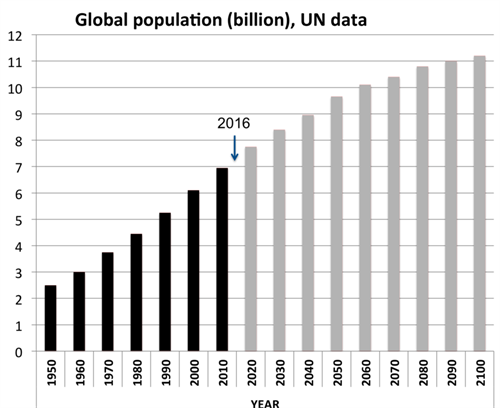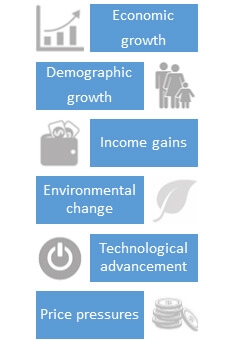
PUMPA - SMART LEARNING
எங்கள் ஆசிரியர்களுடன் 1-ஆன்-1 ஆலோசனை நேரத்தைப் பெறுங்கள். டாப்பர் ஆவதற்கு நாங்கள் பயிற்சி அளிப்போம்
Book Free DemoIn the previous theory, we studied the importance and need for the management of natural resources. In this theory, let us study what conservation of natural resources mean.
First, let us see why there is an increase in demand for natural resources?
There is an increase in demand for natural resources because,
1. The world's population is growing, thus increasing the demand for more natural resources, causing the depletion of resources at an exponential rate.

Increase in population in the world
2. Changing lifestyles and technological advancements are forcing industries to exploit natural resources to meet demand.

Thus, wisely handling natural resources minimises the faster depletion of natural resources. Also, keeping in mind the needs of future generations paves the way for the effective usage of natural resources.
What is meant by resource planning and management?
Resource planning is a skill or a technique for optimum utilisation of resources.
Why is resource planning important?
- Resources are limited in nature, and thus saving for future generations is necessary.
- Resources are not only limited, but they are unevenly distributed over the different parts of the world.
- Resource planning is essential for maintaining optimum usage of resources and protecting it from overexploitation.
Natural resource management is a long-term perspective as resources need to last for future generations. It is our responsibility to reduce and restrain the activities which affect natural resources. So, conservation and judicious use of natural resources are necessary.
Conservation and judicious use of resources
Water, air, plants, and other renewable resources are thought to be plenty, and one might even believe that they will not vanish. However, they will very certainly become scarce, even if they do not vanish. The rate at which the resources renew themselves is substantially slower than the rate at which they are demanded.
For example, we may believe that there is enough water and that we will never run out. However, the truth is that just \(3 \%\) of fresh water on Earth is suitable for human use, while the remaining \(97 \%\) is saline water. Water scarcity will occur in the near future if water is not properly utilised.
Natural resources are conserved due to their biological, economic, and recreational significance. The unplanned and excessive use of natural resources causes environmental imbalance. The exploitation of resources and their replenishment should be kept in a careful balance.
Proper utilisation and management of nature and its resources are termed conservation.
The management of resources should ensure an equal distribution of resources so that all benefit from the resources. Another factor considered when exploiting natural resources is the damage we cause to the environment while resources are used.
For example, mining causes pollution due to the large amount of waste that is discarded for metal extraction. Hence, sustainable resource management is needed. The present-day is aimed for sustainable development and conservation of natural resources.
We must create a sustainable world which should last forever. Some of the strategies or ways to sustain continuous resource use include:
1. To practice the utilisation of energy efficiently.
2. Minimise the wastage of water.
3. To avoid the usage of plastics and other non-biodegradable materials.
4. To take care of the environment we live in.
It is critical that we carefully manage and utilise our resources to preserve them for future generations.
Reference:
https://upload.wikimedia.org/wikipedia/commons/thumb/e/ea/Global_Population_Graph_1950-2100.png/1024px-Global_Population_Graph_1950-2100.png